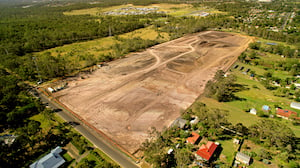Real Estate Development for Fee Offers a New Land Development Solution
People may be interested in property development for all sorts of reasons.
Businesses are constantly evolving – tapping into new product lines and business verticals, consolidating space, and optimizing real estate for their operations. Business owners must regularly weigh the pros and cons of leasing vs. acquiring vs. building their facility, but ground-up development makes sense for various reasons in many cases.
Entrepreneurs in other lines of business may be looking to diversify their own portfolios, and real estate is a good vehicle for that. Real estate offers less volatility and superior risk-adjusted returns to other types of investments and tax benefits that can help offset gains elsewhere.
Maybe someone inherited a piece of land or stumbled upon an investment deal that was too good to pass up. And instead of sitting on vacant land, paying maintenance and property taxes on a non-cash flow producing asset, they’re interested in developing the property.
Or maybe someone just has a vision – they want to shape the future of a neighborhood or deliver a project that enhances the lives of their neighbors and leaves a legacy that future generations can enjoy.
Whatever the reason, unless you’re a full-time developer, you probably have some unanswered questions about the real estate development process. It can be overwhelming – each municipality has its quirks and requirements. The land entitlement process is dictated by the type of project you’re proposing as well as the characteristics of each individual land parcel.
Fee-based development or development for fee offers investors and business owners an alternative to fumbling through the permitting and construction processes themselves. This article provides a deep dive into fee development and why owners might consider the service.
What is development for fee?
A fee-based developer takes on all significant aspects of a real estate development project. Services are typically provided on a percentage of total project costs or a flat fee basis, based on the size of the project and scope of requirements.
In practice, a real estate developer would develop the project, but the project owner would be responsible for taking on the financial obligations related to the deal. This helps offset the project risk – an experienced third-party developer will help manage the various service providers and ensure they're producing efficient designs and properly managing construction costs.
Development for fee offers an alternative to the role developers usually play in a transaction. They typically won’t have any equity in a transaction and are simply being paid for handling a project on behalf of the owner.
What services does a fee-based developer offer?
Every development project is different – real estate due diligence requirements vary across deals, a land's characteristics call for different site plan and construction efforts, and every project has its own land entitlement risks.
Here are a couple of services a fee developer can help with:
Site selection
Land is scarce – quality land is even more scarce. And finding the wrong site can impede a business’s ability to leverage the full extent of its real estate to drive future growth and optimize operations.
Various characteristics impact the functionality and quality of a site – location, demographics, household incomes, taxes, local business climate, ingress/egress, proximity to amenities, off-site improvements, and so on. A site's physical characteristics also impact its viability for future development – zoning, topography, environmental characteristics, utilities, etc.
All that's to say that finding the right is challenging, but it's critically important to the success of a project. A real estate developer can help you weigh the opportunity cost of specific site criteria, find a property that fits your project’s needs, and avoid common site selection pitfalls.
Land planning/site plan development
Project owners who lack particular technical development expertise are forced to outsource the work to outside consultants and service providers.
Every site is unique - the project site plan should reflect the needs of your business and the constraints brought on by the characteristics of the land itself. Civil engineers are excellent project partners, but project owners often give them too much latitude.
It's essential to offer them the freedom to operate, but engineers need guidance like any other project consultant. And that guidance needs to come directly from the project owner – based on the owner's vision, operational business needs, or financial return requirements.
A fee developer will manage the land planning efforts – ensuring efficient design, site value engineering, and design management to control land development costs.
Real estate due diligence
Before buying a property, ensuring the land can support your intended use is crucial; everything from investigating a property's chain of title and identifying any easements to stream & wetland delineations and land use and zoning regulations.
There's a lot to consider, and those real estate due diligence items must be correctly sequenced to avoid unnecessarily risking capital too early in a project.
Development for fee offers an alternative approach - a real estate developer would take on the responsibility of due diligence to vet the site to avoid costly deal breakers properly. Different types of commercial real estate transactions require different types of due diligence investigations. And a full-time developer can help with everything from structuring the land contract advantageously to navigating the critical due diligence activities.
Assembling & managing the development team
One of the most challenging aspects of real estate development is finding the right partners and consultants to help with the project.
Development is a team sport – it takes years of experience to properly qualify the engineers, architects, legal team, contractors, etc., who participate in a deal.
A small business owner or someone who only develops property sporadically likely won't have the contacts or experience to vet these team members. Fee developers often work with the same partners or have in-house services. The result is team synergy and competitive prices.
A lot of management happens during the site plan and construction drawings production process, as well as once you break ground. A fee-based developer coordinates with the team throughout construction, ensuring budget, timeline, and safety compliance.
Land entitlement
Land entitlement is the legal process of securing the required approvals for a development project.
Every municipality has its own process and approval requirements. And every project has its own nuances that call for a different set of permits and authorizations.
Several common land entitlement processes include:
- Land rezoning
- Grading, erosion control, and stormwater permits
- Site plan approval
- Land subdivision and recombination
- Zoning variances and conditional use permits
- Utility, road, and landscape permits
Roadblocks are inevitable during land entitlement. It's common for projects to stall, and securing approvals requires knowledge of the key political players and development ordinances.
Development for fee offers project owners an alternative to fumbling through the land entitlement process – alleviating massive capital and time risks.
Budgeting & financing assistance
Development is unique because you won't know what the project will cost until the project is fully built.
Creating a real estate development budget is complex – it’s iterative and refined based on sitework and land development best guesses, historical vertical construction prices, and 3rd party estimates. As a project owner, you probably don’t have ready access to this information, and you need to know how much building you can afford and what the return parameters look like before greenlighting a project. A fee developer will guide these efforts, helping owners make more informed decisions earlier in a project.
A key aspect of project budgeting and, ultimately, project success is securing financing. While fee-based developers typically won't have equity in a project, they often have an extensive network of lenders and financial partners that can help with financing.
A developer can help an owner present the right story and put the package together for a lender to extend financing for a project. Development financing is unlike most types of real estate funding – the capital stack can be complex, and it's more challenging to lend on ground-up construction.
Design & construction management
Construction cost management is a major component of a successful project – most project design and planning happens during pre-development.
Owner-occupants can get themselves into trouble by overly designing too specialized of a building for their needs. As a result, costs often balloon out of control, and the real estate becomes much more challenging to lease in the future to a 3rd party if needed.
Fee-based developers can help manage design based on industry best practices – weighing the needs of an owner-occupant or an investor's vision against what's more advantageous from a future value perspective.
And as the pre-development phase transitions into construction, that design becomes a reality. Coordinating with all the disparate contractors and consultants to operate according to plan and budget is complex and often outside a project owner's skill set.
Why consider a fee developer
Project owners are often at a disadvantage when trying to develop a property. Consultants deliver services according to their priorities, not those of the owner. And contractors are notorious for looking out for themselves and structuring agreements as contractor-friendly as possible.
Most real estate development projects are time-consuming and take years to complete - they're expensive, risky, complicated, and unpredictable.
And the expertise required to get a deal from planning through construction and completion crosses over various traditional real estate and business functions. It requires an extensive network of professional service providers and investors. Experience in development is valuable, and the ability to employ lessons learned from previous missteps translates to future project efficiencies and actual cost savings.
Hiring a real estate developer can be beneficial for a couple of reasons:
Higher likelihood of a successful project
Projects managed by a professional real estate developer are more likely to be completed than an owner-managed development.
By drawing on past experiences – both failures and successes – a developer will not only help simplify the process but also save time and money. Fee-based development projects are, on average, delivered 33% faster than alternative approaches and allow owners to avoid splitting their focus between a one-off development project and their business.
Risk management
There is some risk that you can't hedge out of a development project. The land entitlement process carries inherent political and permitting risks. And even though real estate is a localized asset, the macroeconomic condition can be volatile and unpredictable.
Business owners manage risk every day throughout the course of their businesses. Real estate investors must weigh the risk of acquiring certain kinds of property in different submarkets. Hiring a fee-based developer is simply a means of reducing project risk.
Commonly, a business's top-line revenue will drop 10-15% if an owner self-manages development. This creates a challenge for project owners as they try to secure construction financing.
It's also important to consider risk mitigation from the lender's perspective as well. Lenders are less inclined to finance a one-off or inexperienced developer's project. With the assistance of a fee-based developer, a lender has greater protection against the project suffering significant setbacks.
Cost savings
It's common knowledge that the more you use a subcontractor's or vendor's services, the more likely they will give you a good deal. On average, project owners will save 20% on vendor and consultant fees by hiring a real estate developer with an existing network of service providers to assist with a project.
But almost more important than simply the cost savings is the service provider's level of attention to the project. Finding a consultant who will pick up their phone or take the time to brainstorm and offer creative solutions to problems is of enormous value. Time delays directly result in increased project carrying costs – proactive consultants will not only stay on top of deadlines and deliverables internally but can positively impact the speed at which municipalities return comments.
A holistic real estate investment outlook
The skillset required to shepherd a project from start to finish crosses over various traditional real estate and business functions. And it takes years, many kinds of projects, and failures to wrap your head around the process.
But it’s not just the mechanics of the development process that influence the likelihood of a successful project – consider the business implications.
Delivering the right building in the right place at the right time lies at the intersection of tax implications, investment and business operations, legal structure considerations, business growth, and financial return parameters. Weighing these influences and delivering a project that meets the owner's intent is much more than just constructing a building.
A fee-based developer with broader real estate consulting experience can help project owners navigate these competing priorities to achieve a successful project.



